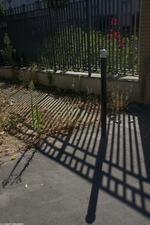Scented Thoughts: On Comparing Perfumes I
While I was reviewing Coeur d'Eté and wearing it for the second time, I realized that this time I was comparing it to other sister scents. Smelling it then, I was less lost into it; I had switched on to an annoying analytical mode, or so I thought. As I felt somewhat disturbed by this, I decided to jot down some notes. Here they are:
I think that it (Coeur d'Eté) smells, however briefly so, a little bit like Champs-Elysées by Guerlain, a little bit like Carolina Herrera, and a little bit like Le Dix by Balenciaga, but all these being fused and made more subtle and complex. This, I think the second time that I try the scent. I cannot help but feel that it is rather reductionist on my part to try to break down the perfume into tiny bits and to find external references for it. In the end, it is not interesting....
It has a practical purpose which is to communicate better about a perfume with another person who has never smelled it, but might have come upon the other ones you mention. yet, I realize also that it is unfair to the perfumer. It is like trying, too soon, to decompose the colored pigments found on a picture instead of contemplating it. It is also unfair towards yourself as it distorts your perception of the perfume.
I am reminded of Edmond Roudnitska's advice. He once said that one should never attempt to compare a perfume to other scents because a perfume is by essence unique, meant to be appreciated on its own terms and that it was composed with that ontological orientation in mind. Doing otherwise would be like attempting to read two books at once or listening to two musics at once or deciphering a book instead of reading it. Confusion, cacophonia and analytical poverty will ensue.
I find that, perhaps, this strong idealistic streak we find in the perfume creative process, as envisionned by Roudnitska, is somehow irremediably linked to an idealization of womanhood and femininity. The perfume is unique like a woman is unique to a man who loves her; it is meaningless to situate that woman within a series of comparisons for that man. In other words, Roudnitska is begging us to view a perfume with the eyes of love in order to take in its full beauty and uniqueness. So, we should resist the temptation to say "Y is a little bit like X."
This idea is not lost on women; instinctively we look for the quality of uniqueness in a scent. That uniqueness will help underline our own uniqueness, make us true objects of love. An erotic dialogue is thus expressed through perfumes in our cultures.
Roudnitska's ideals are embodied in Le Parfum de Thérèse which he created originally for his wife Thérèse. It is now available to the wider public of those other women through the Malle Editions de Parfums. We can thus touch that dream both aesthetic and erotic with the tip of our fingers and be reminded of a principle of unicity that was very important to him.
Of course, this principle does not need be applied to serially produced perfumes who enthusiastically copy each others. But when we encounter a perfumer-composer with integrity and personal vision, we should, I think, forget about the other fragrances that fleetingly juxtapose themselves on the perfume you are smelling. It is perhaps like saying that an ensemble of seven notes are similar to that other musical passage in that other musical partition. It does not make much sense and it gives too much importance to the external reference. It makes your view of the perfume superficial.
However, I must admit that if I feel bad doing this for a work by Roudnitska and a good one by Harris, I am much less embarrassed to do so for a perfume that is mass-produced and whose artistic aims are set lower. In this latter range of products, the defining mode of creation is extremely referential and fully aware of the externality of fashion trends in fragrances. One does not seek uniqueness in this case because it is simply too demanding and too risky. You seek variation rather or a twist on an idea. The irony is of course that people in fact crave uniqueness in perfumes. A perfume like Angel was mass-marketed, yet it was innovative and daring, and it has now taken over Chanel No5's place as the most popular perfume in France. And of course, Chanel No5 was daring too.
Coeur d'Eté, to me, cannot be approached in a comparative manner. It has an integrity of its own which is the result of the artistry that presided over it and this should be respected, I think. At any rate, something in this perfume made me feel guilty for looking sideways at others.
Photo is from Art et Parfum










Thank you for this very interesting post and your thoughts. I 100% agree; if comparative approaches are ok for artful and visionary composed fragrances, then it is maybe comparing the impression they bring about with the impression brought by other fragrances. Like "I love Steve Reich's Desert music for it touches my heart in the same way as does Vivaldi's four seasons.
Thank you Andy.
Yes, you're right; one's comparisons should be made at an artistic level. Looking for perfume quotes in a truly artistic fragrance is just tearing the perfume apart and failing to see its interiority, its soul (for those scents who can pride themselves in having one:)
We should let the emotional shock happen and cultivate it with more images, more art, more of the direct sensations that we have experienced in our lives.
We should try to understand a perfume and not just attempt to identify it. But the latter approach is probably required for the more common ones.
Also, I think you can compare the different perfumes of a perfumer between themselves, provided the perfumer was allowed to express his ideas freely. Yet, I'm not sure Roudnitska would even accept that. For example, towards the end of his life, he became critical of Femme, seeing in it something easy because of his use of fruity notes.
Funny, because while reading your original review of Coeur d'Ete, I did not get the impression that it smelled like any of the three fragrances you mentioned above. Not at all.
In fact, it sounds like a unique, truly beautiful fragrance that I am now "dying" to test.
Hugs!
I had to make an effort to distance myself from these "flashes" of thoughts that crossed my mind. There were very brief moments when it smelled familiar like these other fragrances I mentioned. It's the way memory and scent are so intimately connected, it evokes certain things almost in spite of yourself. But then you realize that the vision of the artist is completely different.
It's a very rich, delicate, and complex fragrance, truly unique and masterful.
These unwanted references did not cross my mind the first time at all, so I tried to recapture that. It's when I started analyzing more and breaking it down that I came to overthink the fragrance. I call these two approaches the ensemble view and the close-up view or the contemplative mode versus the analytical mode. That's how my mind operates:)
Enjoy!
Dear Mimi,
Of course, now that I finally have time to read over your week's posts, I must say that I am thoroughly enjoying this conversation we have been having on our blogs about this subject. The irony of it is, in an attempt to write about being more present and less analytical/objective/evaluative, I feel that I become so abstract that I am defeating the initial purpose of being present to the smell.
I really enjoyed hearing your thoughts on Roudnitska and idealization of a woman/perfume. Interesting.
Clearly, we who are women and who perfume ourselves are differently situated than Roudnitska.
When you tsk yourself for being reductionist I think to myself that one may to avoid merely describing by comparison is to ask what a fragrance performs or what it does rather than what it is like.
On the other hand, I was recalling that Jean Carles' method of training for perfumers was via comparison and contrast -- sort of an interpolation.